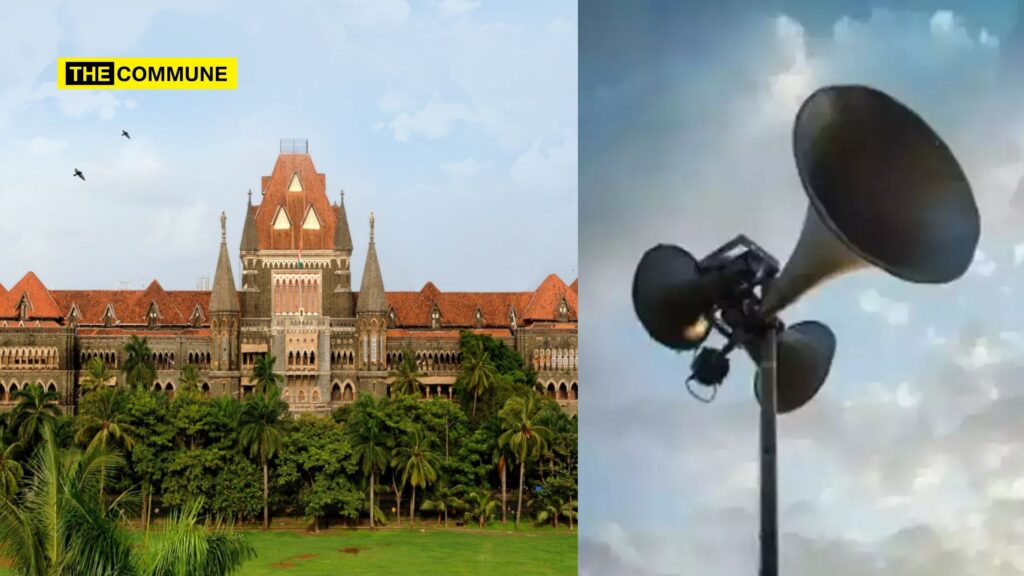The Bombay High Court has ruled that the use of loudspeakers for prayers or religious discourses is not an essential practice of any religion and directed the Mumbai Police to strictly enforce the Noise Pollution Rules, 2000. The order emphasizes that no religious establishment should cause noise pollution through loudspeakers.
The division bench comprising Justices Ajay Gadkari and Shyam Chandak highlighted Mumbai’s cosmopolitan nature, where individuals from diverse religious backgrounds reside, and noted that “noise is a major health hazard on various aspects.”
The court asserted, “No one can claim that his rights are affected in any manner if he is denied a permission to use loudspeaker. It is in public interest that such permissions should not be granted. By denying such permissions, rights under Article 19 or 25 of the Constitution of India are not at all infringed. Use of loudspeakers is not an essential part of any religion.”
Guidelines For Addressing Noise Pollution Complaints
The bench provided explicit instructions for the Mumbai Police on handling complaints related to noise pollution from religious establishments. The guidelines include:
- Initial Warning: Upon receiving a complaint, the police should caution the offender, without seeking or disclosing the complainant’s identity.
- Fines for Repeat Offenses: If subsequent complaints are received, a fine under Section 136 of the Maharashtra Police Act should be imposed on the concerned religious establishment, recoverable from its trustees or managers. A warning of stricter actions should accompany the fine.
- Seizure of Equipment: For repeated violations, the police should seize loudspeakers or amplifiers under Section 70 of the Maharashtra Police Act and consider canceling the establishment’s license to use such equipment.
Case Background
The court was hearing a plea filed by two resident welfare associations from the Kurla and Chunabhatti areas of Mumbai. The petitioners accused several mosques and madrasas in their vicinity of causing “unbearable” noise pollution by using loudspeakers for Azan and religious discourses at least five times a day.
The petitioners claimed the mosques used these sound systems without requisite permissions, and despite repeated complaints, the local police failed to take appropriate action. During the COVID-19 lockdown, permissions were granted to use loudspeakers within permissible decibel levels, but the establishments allegedly continued to exceed the limits.
The court observed that the failure of the authorities to act necessitated the filing of the petition. It emphasized, “In a democratic State, there cannot be a situation that a person/group of persons/association of persons would say that it will not follow or adhere to the law of the land and the law enforcers would be meek or silent spectators to it.”
The bench noted that the permissible noise levels under the Noise Pollution Rules are 55 decibels during the day and 45 decibels at night. It clarified that the cumulative noise from all loudspeakers in use must adhere to these limits, stating, “The law does not permit that, every individual loudspeaker will emit 55 or 45 decibels of noise aggregating to more than what is prescribed under the said Rules. That would amount to frustrating the intention of Legislature.”
The court further noted that the fines prescribed for noise pollution—₹5,000 per day, amounting to ₹18.25 lakh for 365 days—may not deter habitual violators. “The violators do it as a matter of right, and the complainants, often individuals, are hapless and helpless victims of these obnoxious use of loudspeakers and/or amplifiers,” the bench remarked.
The court directed the Maharashtra government to implement measures for controlling noise pollution at religious establishments, regardless of faith. It suggested an “inbuilt mechanism” for sound-emitting devices to ensure compliance with decibel limits. The bench also urged the government to explore calibration or automatic decibel limit fixation for all public address systems used by religious institutions.
(With inputs from LiveLaw)
Subscribe to our channels on Telegram, WhatsApp, and Instagram and get the best stories of the day delivered to you personally.

